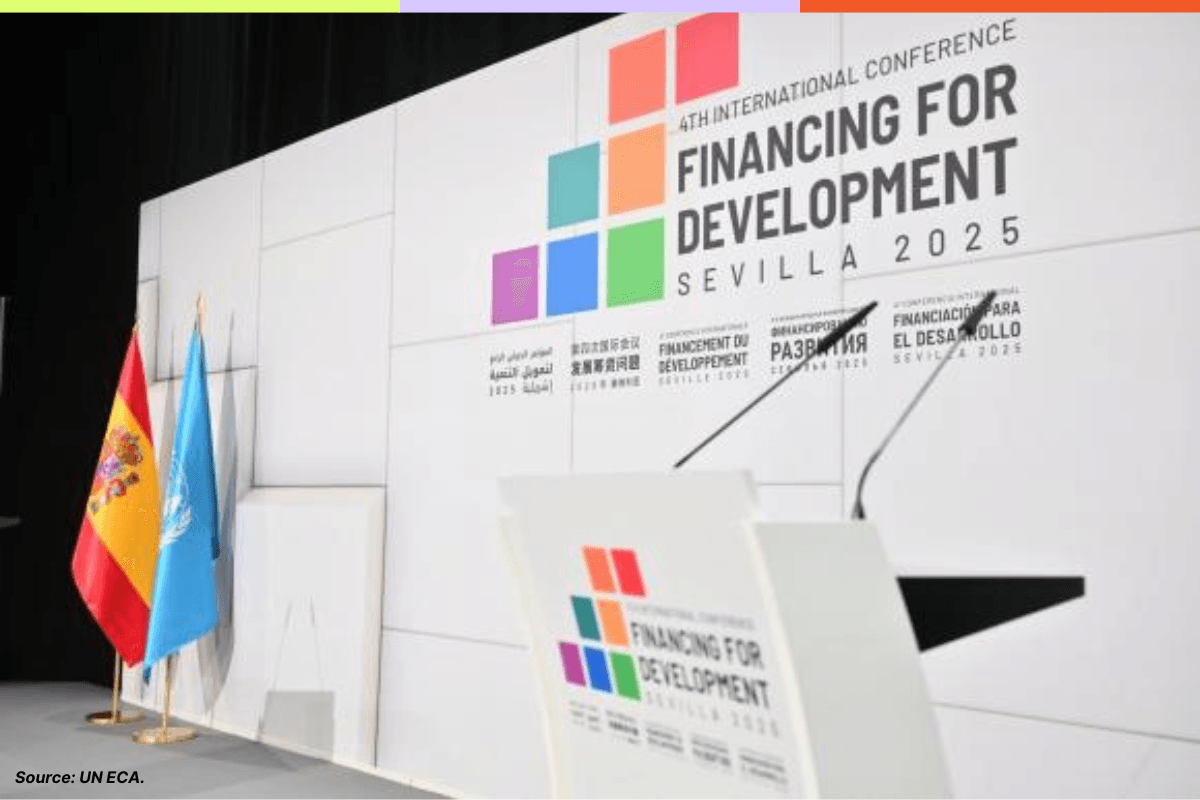Analysis of the Financing for Development Outcome Document from a women’s rights perspective

Share
The Fourth International Conference on Financing for Development took place in Sevilla, Spain, from 30 June to 3 July. Months of complex negotiations culminated in the Compromiso de Sevilla, a landmark document calling for urgent reform of the international financial system amid mounting geopolitical and economic pressures.
Against a backdrop of deep official development assistance (ODA) cuts, debt crises, and rising geopolitical tensions, FfD4 became a litmus test for multilateralism. Debates on women’s rights and gender equality, in particular, revealed deep divides. Yet the outcome marked a significant win: proof that determined and good diplomacy can still bridge differences.
Spain’s leadership as host and the dedication of the four co-facilitators were pivotal in achieving this consensus, which builds on the legacy of past FfD conferences and sets a course for systemic change.
The place of women and girls in the Compromiso de Sevilla
The Compromiso de Sevilla includes important references to women, girls, and gender equality. Still, significant gaps remain, especially regarding debt, ODA, climate finance and the structural reforms needed for a truly gender-equal financial system. However, rather than a ceiling for ambition, this commitment serves as a floor from which to continue building efforts to ensure women and girls are equally and fairly served by the international financial system.
Chapeau
- Reflects some of the major issues regarding gender equality and FfD in Paragraph 11.
- Reaffirms the imperative of achieving gender equality and the empowerment of all women and girls.
- Includes a breakthrough mention of the feminization of poverty.
- Commits to invest in the care economy and redistribute unpaid care and domestic work.
- Reaffirms Parties’ commitment to eliminate gender-based violence.
- Promotes entrepreneurship among women and youth
- Other paragraphs include important mentions to making quality healthcare and education inclusive and available for all, and increasing social protection coverage - all of which can significantly help to close gender gaps and empower women and girls.
Domestic Resource Mobilization
- Parties committed to gender responsive budgeting, and advance discussion on gender responsive taxation.
Private Finance
- Mentions the expansion of access to financial products and services across society, particularly for women (and other subgroups).
- Recognizes that additionally structural barriers must be addressed, and financial and digital literacy strengthened.
- Calls for solutions for smallholder and women farmers to protect against, among others, disaster and climate change impacts
- Encourages eliminating gender-based price differentiation.
International development cooperation and ODA
- NO MENTIONS OF WOMEN OR GENDER EQUALITY.
- As ODA budgets shrink, inequalities grow. Women and girls are hit hardest by this decline - facing reduced access to education, worsened health outcomes, increased gender-based violence, and weakened social protection systems. Given that these issues are addressed in other parts of the Sevilla Commitment, the missing link between gender equality and ODA becomes even more apparent. GWL Voices will continue advocating for the need for increased and gender-responsive ODA.
International trade
- Calls for support to remove barriers for access, including for MSMEs, and women and youth-owned businesses, as well as disability-owned businesses, to better integrate them in regional and global value chains
Debt and Debt Sustainability
- NO MENTIONS OF WOMEN OR GENDER EQUALITY.
- GWL Voices has advocated for alleviating countries’ increasing debt burdens, which disproportionately impact women and girls through austerity measures that target essential social services. Without comprehensive and gender-responsive debt restructuring, gender gaps will continue to widen, and women and girls will face more barriers to reaching full and equal empowerment.
Systemic issues
- Aims to achieve gender balance in the executive boards of all international organizations through more balanced nominations to the boards
Technology
- Recognizes that technological advances can worsen gender inequality
- Will promote access to science and technology across societies, including by enhancing STEM skills among children, youth, women and girls, persons with disabilities and people in vulnerable situations to address divides in STI.
- Commits to implement financial and digital literacy programmes that target all segments of society, including women and girls (and other subgroups)
Data, monitoring and follow up
- Commits to strengthen efforts to collect, analyse and disseminate relevant and reliable data disaggregated by sex and other characteristics to achieve gender equality and the empowerment of all women and girls.
A Note on the Climate - Development Nexus
- Although the Sevilla Commitment recognizes that we are falling short in tackling climate change, biodiversity loss and ecosystem degradation, the connection between climate finance and development finance was significantly weakened as FfD negotiations progressed. This sets a worrying precedent for those most in need of receiving funds for climate mitigation, adaptation, and development - three inextricable and existential goals.
GWL Voices will continue to advocate for aligning Development and Climate Finance Goals, ensuring gender-responsive, concessional and accessible finance is available for women and girls.
Turning words into action: Sevilla Platform for Action
While the Compromiso de Sevilla stops short of transformative change of the international financial architecture, the agreement keeps the door open for incremental steps towards a more inclusive, equitable, and gender-responsive economic governance system.
One of the most promising outcomes of the FfD Conference, is the launch of the Sevilla Platform for Action (SPA), which compiles over 130 multi-stakeholder initiatives to transform ambition and commitments to on-the-ground action.
The SPA includes nearly 70 initiatives that address (among others) SDG 5 on Gender Equality.
GWL Voices has endorsed 2 SPA initiatives that directly address gender equality in the context of financing for development:
- Investing in care for Equality and Prosperity: A Global Initiative to Advance Gender-Responsive Financing for Development
Lead by: Brazil; Colombia; Mexico; UN Women; Global Alliance for Care
- Financing for Gender Equality: A Multistakeholder Partnership for Action
Lead by: Spain; UN Women
These initiatives will produce specific roadmaps and Action Plans that should include built-in mechanisms of accountability and action trackers.